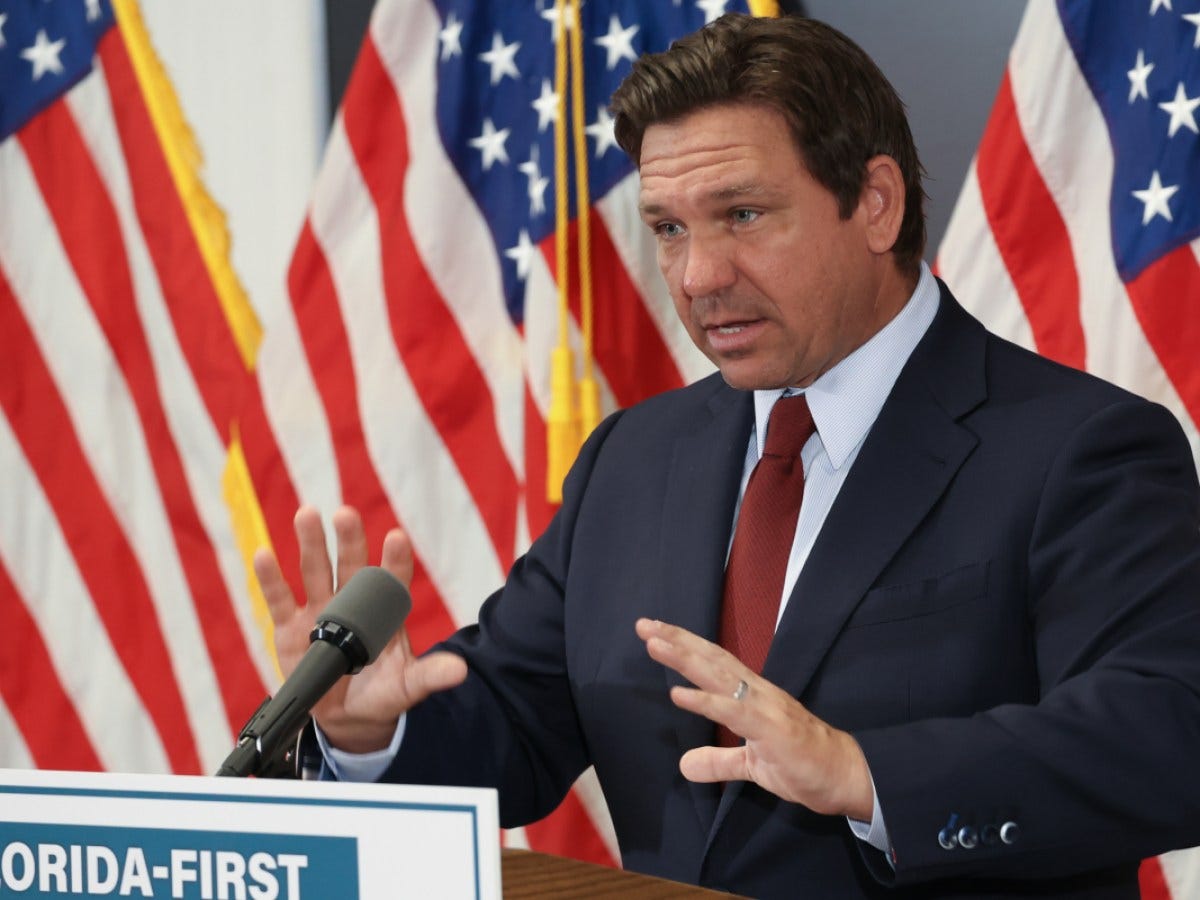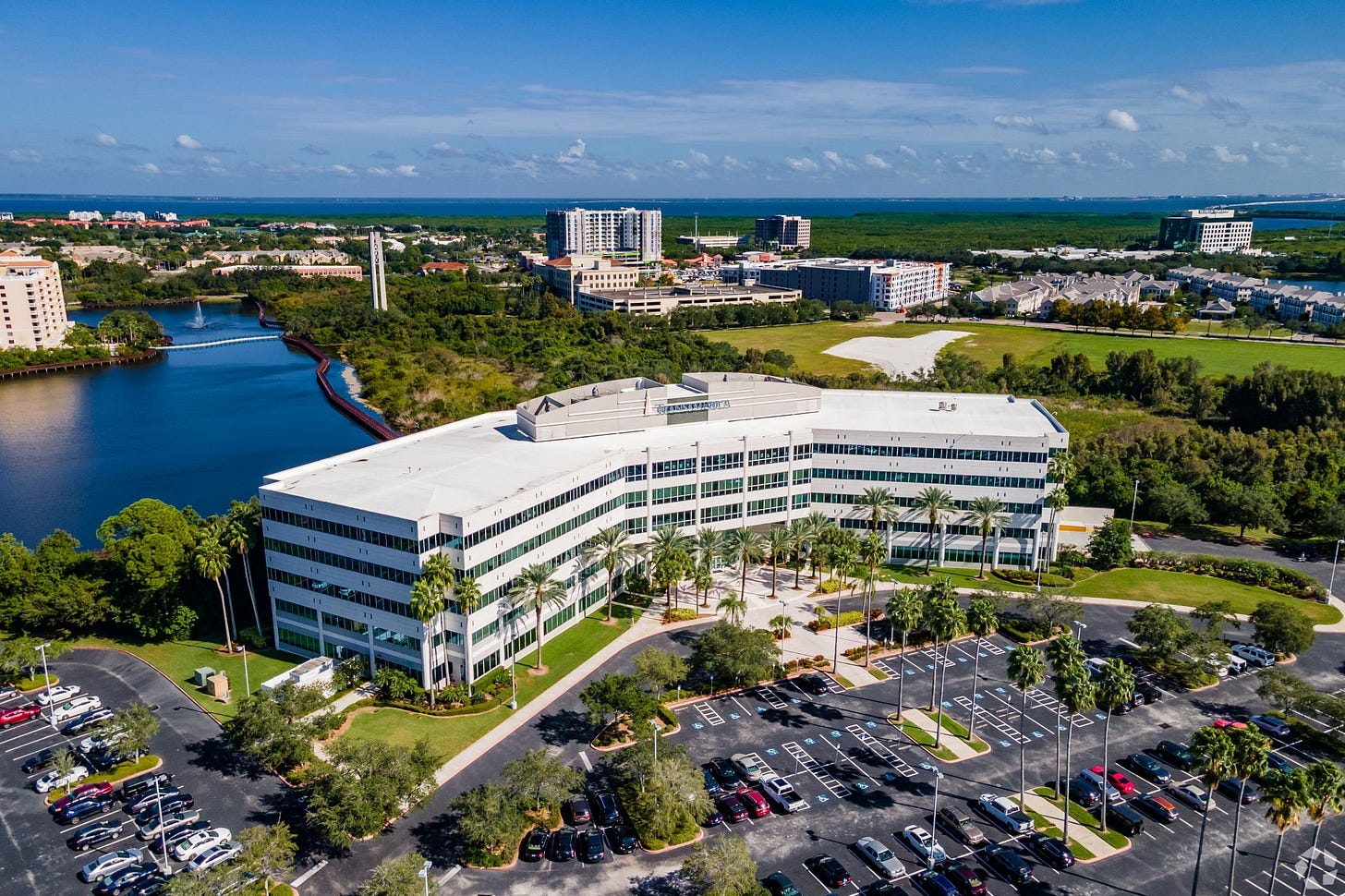DeSantis Pushes New Property Tax Relief Plan & Florida's $160M Mismanagement of Medicaid Funds
April 3, 2025 - This Week's News from Central Florida
Welcome to this week’s edition of the Central Florida Times, an independent, reader-supported newsletter focusing on the Sunshine State. These are the most important stories you need to know from across Central Florida. To never miss an update, subscribe here:
Here’s the latest from Central Florida…
DeSantis Pushes Property Tax Relief, Rejects Sales Tax Cut Proposal
Governor Ron DeSantis has unveiled a property tax relief proposal aimed at saving Florida homeowners around $1,000 each over the next year. The move intensifies a debate with Republican House Speaker Daniel Perez (R-Miami), who has pushed for a statewide sales tax cut instead. During a Monday press conference in Orlando, DeSantis criticized Perez’s plan to reduce the state sales tax from 6% to 5.25%, arguing it would benefit tourists and part-time residents more than Floridians. “People are not clamoring for sales tax relief; they’re clamoring for property tax relief,” DeSantis said. His proposal would provide immediate savings for over five million homesteaded properties, leveraging the state’s budget surplus to cover a portion of property taxes. He also reiterated his previous calls for a 2026 constitutional amendment to eliminate or reduce property taxes. Perez welcomed DeSantis’ proposal but defended his sales tax plan, which he says would save Floridians $5 billion annually. Meanwhile, Senate President Ben Albritton (R-Wauchula) expressed openness to both opposing tax-relief ideas but cautioned against long-term budget shortfalls, alluding to state economists' projections of a $10 billion deficit in the next three years. Albritton supported instituting any new widespread tax cuts temporarily. Lawmakers have until May 2 to finalize their decision on these competing proposals.
DeSantis Administration Faces Scrutiny Over Possible Mismanagement of $160M in Medicaid Funds
Governor Ron DeSantis and the Agency for Healthcare Administration (AHCA) are under fire following a report suggesting the state may have mishandled $160 million in federal Medicaid funds. Allegations center on accounting errors and an unpaid federal penalty that may have led to the financial loss, raising concerns about AHCA’s oversight and accountability among lawmakers. State Representative Alex Andrade (R-Pensacola), chair of the House Health Care Budget Subcommittee, revealed that the Agency for Health Care Administration (AHCA) received state funds to cover a $160 million federal penalty but instead misallocated the money. “Instead of using the money to pay the fine, AHCA put it in the wrong account… and used it for cash flow,” Andrade said, blaming poor oversight. “DeSantis has been asleep at the wheel on the day-to-day administration of the Medicaid program,” he added. The controversy occurred during Jason Weida’s tenure as AHCA Secretary, whom DeSantis recently promoted to Chief of Staff in February. emphasized the importance of safeguarding public funds, stating, “This is the public’s money...we are holding it in trust for the citizens.” Former governor and current U.S. Senator Rick Scott also expressed alarm and called for accountability, saying taxpayers shouldn’t be responsible for errors. “The state should find a way to pay it back to the federal government,” Scott said. “The last thing the state should be doing is asking for even more of Floridians’ tax dollars to pay back the federal government.” AHCA has responded to the scandal by implementing staffing changes, hiring independent contractors, and enhancing communication between divisions to prevent human error. The DeSantis administration dismissed claims of “lost” funds as inaccurate and labeled them as “clickbait.”
Republicans Win Florida’s Special Elections, Dash Democratic Hopes
For a brief moment, Florida Democrats dared to hope. In two special congressional elections, Democratic candidates Josh Weil and Gay Valimont put up stronger-than-expected fights in deeply conservative districts, raising millions more than their Republican opponents. The national political climate—fueled by opposition to President Donald Trump’s policies—gave Democrats reason to believe they could flip at least one seat. However, by Tuesday night, Republican victories became apparent. In Florida’s 1st Congressional District, located in the Panhandle, Democrat Valimont’s bid fell short, handing now-former Chief Financial Officer Jimmy Patronis a win shortly after polls closed at 8:00 PM. He overcame a 3-to-1 fundraising advantage by Democrats, bringing in only about $2.1 million compared to Valimont’s $6.5 million. Trump endorsed Patronis’ candidacy for the seat in November 2024 after then-Congressman Matt Gaetz was initially tapped to lead the U.S. Department of Justice and resigned from the U.S. House. In the 6th Congressional District, Trump-backed Randy Fine emerged victorious over Weil. The Associated Press called the race shortly after 7:30 PM, as a late Republican surge secured his win. Fine also prevailed over an even greater financial edge by Democrats, with the Weil campaign raising over $10 million against Fine’s modest $1 million fundraising total. While both races showcased Democratic enthusiasm and significant overperformance in conservative strongholds, the GOP’s success ensured Florida’s political map remained unchanged as Republicans added to their narrow seven-seat majority in the U.S. House.
Central Florida Food Bank in ‘Crisis’ Amid Federal Cuts
The Second Harvest Food Bank of Central Florida is scrambling to address a major food shortage after the Trump administration abruptly canceled deliveries of fresh food that were scheduled to arrive last week. The loss of $1.6 million worth of produce, dairy, and meat has pushed the regional food bank into "crisis mode," said Greg Hickerson, the agency’s chief development officer. “This means lots and lots of families aren’t going to have as much food available,” Hickerson said. The now-canceled shipments were part of a U.S. Department of Agriculture (USDA) program launched during the pandemic to support food banks by purchasing surplus food from American farmers. Second Harvest relied on this program for about 10% of its food supply, including much of its fresh food. The food bank could lose 5.8 million meals annually if the cuts remain permanent. In Central Florida, the program’s cancellation will affect not only Second Harvest but also USDA’s community partners that help distribute food, including the Salvation Army and locally-run food pantries. As grocery prices remain elevated, low-income families continue to face challenges making ends meet, and the demand for food assistance remains high.
DeSantis Charity Not Following State Laws, Per House Report
A Florida House committee report has found that The Hope Florida Foundation, a charity closely affiliated with Gov. Ron DeSantis and First Lady Casey DeSantis, has not complied with state laws regarding oversight, ethics, and financial transparency. According to the analysis, the foundation, which supports the Hope Florida initiative, has also not filed its federal tax returns. Hope Florida, launched in 2021 by First Lady Casey DeSantis, seeks to reduce government welfare dependency by connecting Floridians with faith-based and charitable organizations. The program has expanded across multiple state agencies, and DeSantis is pushing legislation to make it a permanent state initiative. However, the foundation’s financial records remain unclear. It has disbursed at least $375,000 to churches, but has not disclosed its activities and structure to state lawmakers and auditors as state statutes require. Additionally, an annual audit, mandated by state law, has not been conducted. Despite concerns over accountability, lawmakers are moving forward with efforts to solidify Hope Florida into law.
DeSantis Rebukes House Republicans for Overriding Budget Vetoes
Gov. DeSantis criticized Florida House Republicans for recently overriding his vetoes on four budget items totaling $4.7 million. In a video posted on X, DeSantis expressed frustration, accusing lawmakers of prioritizing spending over addressing “pressing issues that Floridians care about.” The overrides reinstated funding for water treatment in Rockledge, sewer upgrades in Baldwin, a state prison staffing and payroll system, and a nonprofit helping veterans access health benefits. DeSantis argued that the decision undermines the $950 million in savings he achieved through vetoes last year. “Republicans in the Florida House voted to undo millions of dollars in cost savings,” he said, while accusing them of ignoring critical topics like condo reform, universal E-Verify, and property tax relief. House Speaker Daniel Perez defended the move, emphasizing the Legislature’s constitutional duty to craft the state budget. The House’s reversal of the governor’s vetoes represents a small fraction of the $118.6 billion budget signed by DeSantis last year.
1.4M Gallons of Wastewater Spilled into Tampa Bay
More than 1.4 million gallons of partially treated wastewater flowed into northern Tampa Bay last week after a maintenance issue at a Clearwater treatment plant, city officials said. City officials claim there is no threat to public health after taking water quality samples, and staff immediately assessed potential environmental impacts. The spill occurred at Clearwater’s east treatment facility when a settling tank became overloaded during regular maintenance, forcing workers to divert wastewater into the bay. The city reported the spill to state environmental regulators. The wastewater emptied into Old Tampa Bay, adding to concerns about the health of this struggling section of the estuary that has lost 320 acres of vital seagrass in two years. While this spill is significant, recent hurricanes caused 40 million gallons of sewage overflows, compounding pollution concerns in Florida’s largest open-water estuary.
Pinellas, St. Pete Weigh Seeking Reimbursement From Rays for Stadium Deal Expenses
Pinellas County officials are considering asking the Tampa Bay Rays to reimburse public funds spent on the now-abandoned stadium deal. St. Petersburg Mayor Ken Welch supported the idea, noting the city spent over $2.4 million on consultants, analysis, and legal fees. The team backed out of the $1.3 billion project in March, leaving city and county officials frustrated over wasted resources. One county commissioner has directed county staff to calculate costs related to legal fees and consulting work incurred during negotiations. “We have spent a lot of money,” Mayor Welch said, emphasizing the extensive effort put into the deal. While local officials agree with seeking reimbursement, others doubt the Rays are legally obligated to pay. A Rays spokesperson declined to comment, though the team reportedly spent $11.6 million on the project. The failed stadium agreement officially terminated on March 31.
Florida Insurance Company to Repay State $30M Over Disputed Claims
One of Florida’s largest homeowners insurance companies, Universal Property & Casualty Insurance Co., has agreed to repay $30 million to the state following allegations it fraudulently backdated claims related to Hurricane Irma in 2017. The Fort Lauderdale-based insurer will also pay over $4 million in fines and implement policy changes as part of a settlement announced by Attorney General James Uthmeier. Universal falsely labeled ineligible claims as storm-related to secure reimbursement from the Hurricane Catastrophe Fund, according to Uthmeier. The investigation, triggered by a whistleblower lawsuit filed in 2020, found that Universal submitted “numerous unrelated claims” to the state’s hurricane fund, violating the Florida False Claims Act. The company denies any wrongdoing and stated that the claims represented only 1% of its Hurricane Irma submissions. The $30 million fine marks one of the largest penalties for a Florida insurer in over a decade.
Foot Locker Signs Lease for New Global Headquarters in St. Petersburg
Foot Locker has officially signed a lease to relocate its global headquarters to St. Petersburg, marking a significant investment in the city’s economy. The Fortune 500 company will occupy 110,998 square feet in the Carillon Business Park. The move is expected to create 150 high-paying jobs with an average annual salary of $120,000. Foot Locker’s relocation follows $475,000 in incentives approved by the St. Petersburg City Council last year to attract the New York-based company. The footwear and sportswear company plans to invest at least $20 million in its new headquarters as part of its long-term growth strategy.
MLB Commissioner Pressures Rays Owner to Reveal Future Plans
Major League Baseball Commissioner Rob Manfred has called on Tampa Bay Rays owner Stuart Sternberg to outline a clear plan for the team’s future following the collapse of the proposed $1.3 billion St. Petersburg stadium deal. Speaking on SiriusXM Radio, Manfred emphasized the need for a “go-forward plan,” stating, “I don’t think it’s realistic to play indefinitely in a repaired Tropicana Field.” While repairs to the hurricane-damaged Trop are underway, Manfred expressed hope it would be ready for 2026, allowing the team to remain in St. Petersburg through at least 2028. He also reiterated MLB’s commitment to keeping the Rays in the Tampa Bay area, calling it a “major-league market.” However, he stressed that Sternberg must provide clarity to fans and league officials about long-term solutions, including potential stadium options in Tampa or elsewhere in the region.
HSN to Cut 730 Jobs in St. Petersburg as Headquarters Relocates
HSN will lay off 730 employees as it prepares to close its St. Petersburg headquarters by the end of 2025. The layoffs, announced in a letter to the Florida Department of Commerce, will occur in phases, with the first round impacting 145 workers starting May 26 and additional cuts planned for July. HSN, which has operated in Pinellas County for over 40 years, announced in January that it would consolidate operations with its parent company, Qurate Retail Group, at QVC’s headquarters in West Chester, Pennsylvania.
Hooters Files for Bankruptcy, Original Founders to Acquire 100 Restaurants
Hooters of America, the Clearwater-founded restaurant chain famous for its chicken wings and waitresses, has filed for Chapter 11 bankruptcy protection, aiming to restructure its $376 million debt while ensuring all restaurants remain operational. As part of the restructuring, 100 company-owned locations will be sold to a group of franchisees, including the brand’s original Clearwater founders. This group already operates 14 of the highest-grossing Hooters locations, many of them in Tampa Bay, where the first Hooters opened in 1983. “The Hooters brand will once again be in the hands of highly experienced franchisees,” said Neil Kiefer, CEO of Clearwater-based Hooters Inc. The casual dining chain, which has faced financial struggles, lawsuits, and shifting consumer preferences, will continue operating over 420 locations worldwide while working to revitalize the brand under new leadership.
Thanks for reading this edition of the Central Florida Times. To never miss an update, subscribe for free:
In the meantime, if you learned something or found this read interesting, please consider sharing it to grow our community!











